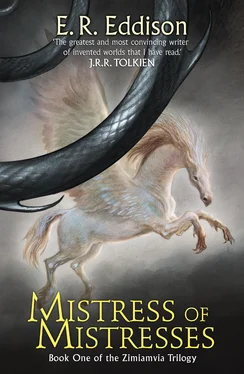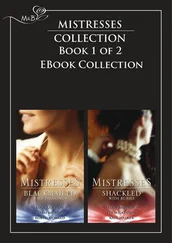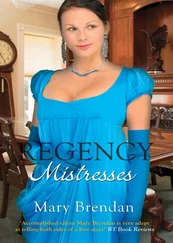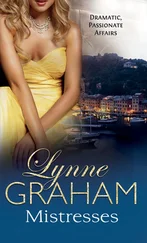E. Eddison - Mistress of Mistresses
Здесь есть возможность читать онлайн «E. Eddison - Mistress of Mistresses» — ознакомительный отрывок электронной книги совершенно бесплатно, а после прочтения отрывка купить полную версию. В некоторых случаях можно слушать аудио, скачать через торрент в формате fb2 и присутствует краткое содержание. Жанр: unrecognised, на английском языке. Описание произведения, (предисловие) а так же отзывы посетителей доступны на портале библиотеки ЛибКат.
- Название:Mistress of Mistresses
- Автор:
- Жанр:
- Год:неизвестен
- ISBN:нет данных
- Рейтинг книги:5 / 5. Голосов: 1
-
Избранное:Добавить в избранное
- Отзывы:
-
Ваша оценка:
- 100
- 1
- 2
- 3
- 4
- 5
Mistress of Mistresses: краткое содержание, описание и аннотация
Предлагаем к чтению аннотацию, описание, краткое содержание или предисловие (зависит от того, что написал сам автор книги «Mistress of Mistresses»). Если вы не нашли необходимую информацию о книге — напишите в комментариях, мы постараемся отыскать её.
Mistress of Mistresses — читать онлайн ознакомительный отрывок
Ниже представлен текст книги, разбитый по страницам. Система сохранения места последней прочитанной страницы, позволяет с удобством читать онлайн бесплатно книгу «Mistress of Mistresses», без необходимости каждый раз заново искать на чём Вы остановились. Поставьте закладку, и сможете в любой момент перейти на страницу, на которой закончили чтение.
Интервал:
Закладка:
With a sudden violence the Duke dashed his handful of brushes to the ground and flung his palette skimming through the air like a flat stone that boys play ducks and drakes with, till it crashed into a clump of giant asphodel flowers a dozen yards away. Two or three of those stately blooms, their stems smashed a foot above the ground, drooped and slowly fell, laying pitifully on the grass their great tapering spikes of pink-coloured waxen filigree. His boy went softly after the palette to retrieve it. He himself, swinging round a good half circle with the throw, was gone in great strides the full length of the garden, turned heel at the western parapet, and now came back, stalking with great strides, his fists clenched. The company was stood back out of the way in an uneasy silence. Only the Lady Fiorinda moved not at all from her place beside the easel of sweet sandalwood inlaid with gold. He came to a sudden halt within a yard of her. At his jewelled belt hung a dagger, its pommel and sheath set thick with cabochon rubies and smaragds in a criss-cross pattern of little diamonds. He watched her for a moment, the breath coming swift and hard through his nostrils: a tiger beside Aphrodite’s statua. There hovered in the air about her a sense-maddening perfume of strange flowers: her eyes were averted, looking steadily southward to the hills: the devil sat sullen and hard in the corner of her mouth. He snatched out the dagger and, with a savage back-handed stroke, slashed the picture from corner to corner; then slashed it again, to ribbons. That done, he turned once more to look at her.
She had not stirred; yet, to his eye now, all was altered. As some tyrannous and triumphant phrase in a symphony returns, against all expectation, hushed to starved minor harmonies or borne on the magic welling moon-notes of the horn, a shuddering tenderness, a dying flame; such-like, and so moving, was the transfiguration that seemed to have come upon that lady: her beauty grown suddenly a thing to choke the breath, piteous like a dead child’s toys: the bloom on her cheek more precious than kingdoms, and less perdurable than the bloom on a butterfly’s wing. She was turned side-face towards him; and now, scarce to be perceived, her head moved with the faintest dim recalling of that imperial mockery of soft laughter that he knew so well; but he well saw that it was no motion of laughter now, but the gallant holding back of tears.
‘You ride me unfairly,’ he said in a whisper. ‘You who have held my rendered soul, when you would, trembling in your hand: will you goad me till I sting myself to death with my own poison?’
She made no sign. To the Duke, still steadfastly regarding her, all sensible things seemed to have attuned themselves to her: a falling away of colours: grey silver in the sunshine instead of gold, the red quince-flowers blanched and bloodless, the lush grass grey where it should be green, a spectral emptiness where an instant before had been summer’s promise on the air and the hues of life and the young year’s burden. She turned her head and looked him full in the eye: it was as if, from between the wings of death, beauty beaconed like a star.
‘Well,’ said the Duke, ‘which of the thousand harbours of damnation have you these three weeks been steering for? What murder must I enact?’
‘Not on silly pictures,’ said she; ‘as wanton boys break up their playthings; and I doubt not I shall be entreated sit for you again tomorrow, to paint a new one.’
The Duke laughed lightly. ‘Why there was good in that, too. Some drowsy beast within me roused himself and suddenly started up, making himself a horror to himself, and, now the blood’s cooled, happily sleeps again.’
‘Sleeps!’ Fiorinda said. Her lip curled.
‘Come,’ said the Duke. ‘What shall it be then? Inspire my invention. Entertain ’em all to a light collation and, by cue taken at the last kissing-cup, let split their weasands, stab ’em all in a moment? Your noble brother amongst them, ’tis to be feared, madam; since him, with a bunch of others, I am to thank for these beggar-my-neighbour sleights and cozenage beyond example. Or shall’t be a grand night-piece of double fratricide? yours and mine, spitted on one spit like a brace of woodcock? We can proceed with the first today: for the other, well, I’ll think on’t.’
‘Are you indeed that prince whom reputation told me of,’ said she, ‘that he which did offend you might tremble with only thinking of it? And now, as hares pull dead lions by the beard—’
The Duke swung away from her a step or two, then back, like a caged beast. His brow was thunderous again. ‘Ever going on beyond your possession,’ he said, ‘beyond your bounds. ’Tis well I am of a cool judgement. There’s more in’t than hold up my hand, or whistle in my fist. Content you that I have some noble great design on foot, which in good time shall prove prodigious to ’em all: and once holding good my advantage over them, in their fall I’ll tempt the destinies.’
With an infinite slow feline grace she lifted up her head: her nostrils widening, the flicker of a smile on her parted lips: from beneath the shadow of long black lashes, half-moons of green lambent fire beheld him steadily. ‘You must not speak to me as if I were a child or an animal,’ she said. ‘Will you swear me all this?’
‘No,’ answered he. ‘But you may look back and consider of time past: I have been so sparing to promise, that (as your ladyship will bear me out) I have ever paid more than either I promised or was due.’
‘Well,’ she said: ‘I am satisfied.’
‘I must to the throne-room,’ said the Duke. ‘’Tis an hour past the hour of audience, and I would not hold ’em too long tarrying for me; ’tis an unhandsome part, and I use it but to curb the insolencies of some we spoke on.’ The Lady Fiorinda gave him at arm’s length her white hand: he bowed over it and raised it to his lips. Standing erect again, still unbonneted before her, he rested his eyes upon her a moment in silence, then with a step nearer bent to her ear: ‘Do you remember the Poetess, madam?—
As if spell-bound under the troublous sweet hesitation of the choriambics, she listened, very still. Very still, and dreamily, and with so soft an intonation that the words seemed but to take voiceless shape on her ambrosial breath, she answered, like an echo:
Once more Love, the limb-loosener, shaketh me:
Bitter-sweet, the dread Worm ineluctable.
‘It is my birthday, I am reminded,’ said the Duke in the same whispered quietness. ‘Will your ladyship do me the honour to sup with me tonight, in my chamber in the western tower that looks upon the lake, at sunset?’
There was no smile on that lady’s lips. Slowly, her eyes staring into his, she bent her head. Surely all of enchantment and of gold that charged the air of that garden, its breathless promise, its storing and its brooding, distilled like the perfume of a dark red rose, as ‘Yes,’ she said. ‘Yes.’
III THE TABLES SET IN MESZRIA
PRESENCE-CHAMBER IN ACROZAYANA • THE HIGH ADMIRAL JERONIMY • THE LORD CHANCELLOR BEROALD • CARES THAT RACK GREAT STATESMEN • THE BASTARD OF FINGISWOLD • EARL RODER • CONFERENCE IN THE DUKE’S CLOSET • KING STYLLIS’S TESTAMENT • RAGE OF THE DUKE • THE VICAR SUSPECTED KING-KILLER • LEAGUE TO UPHOLD THE TESTAMENT.
MEANWHILE, for nearly two hours in the great throne-room in Zayana had the presence begun to fill against the Duke’s appearing. Now the fashion of that hall was that it was long, of a hundred cubits the length thereof and the breadth forty cubits. The walls were of pale hammered mountain gold, rough with an innumerable variety of living things graven some in large some in little, both hairy kinds and feathered, and scaly kinds both of land and sea, oftenest by twos and twos with their children beside their nests or holes, and the flowers, fruits, leaves, herbs and water-weeds native to each kind winding in the interspaces with a conceited formal luxuriance. Massy columns, four times a man’s height, of carved black onyx with milky veins, made caryatides in form of monstrous snakes, nine lengthwise of the hall on either side and four at either end. These supported on their hooded heads a frieze of tesselated jet four cubits deep, whereon were displayed poppies and blooms of the aloe and the forgetful lotus, all in a cool frail loveliness of opals and rose-coloured sapphires as for their several blooms and petals, and as for their stalks and leaves of green marmolite and chalcedony. Above this great flowered frieze the roof was pitched in a vault of tracery-work of ivory and gold, so wrought that in the lower ranges near the frieze the curls and arabesques were all of gold, then higher a little mingling of ivory, and so more and more ivory and the substance of the work more and more fine and airy; until in the highest all was but pure ivory only, and its woven filaments of the fineness of hairs to look upon, seen at that great height, and as if a sudden air or a word too roughly spoken should be enough to break a framework so unsubstantial and blow it clean away. In the corners of the hall stood four tripods of dull wrought gold ten cubits in height, bearing four shallow basins of pale moonstone. In those basins a child might have bathed, so broad they were, and brimming all with sweet scented essences, attar of roses and essences of the night-lily and the hyperborean eglantine, and honey-dew from the glades beyond Ravary; and birds of paradise, gold-capped, tawny-bodied, and with black velvet throats that scintillated with blue and emerald fire, flitted still from basin to basin, dipping and fluttering, spilling and spreading the sweet perfumes. The hall was paved all over with Parian marble in flags set lozenge-wise, and pink topaz insets in the joints; and at the northern end was the ducal throne upon a low dais of the same marble, and before the dais, stretching the whole width of the hall, a fair great carpet figured with cloud-shapes and rainbow-shapes and comets and birds of passage and fruits and blossoms and living things, all of a dim shifting variety of colours, pale and unseizable like moonlight, which character came of its cunning weaving of silks and fine wools and intermingling of gold and silver threads in warp and woof. The throne itself was without ornament, plainly hewn from a single block of stone, warm grey to look on with veins of a lighter hue here and there, and here and there a shimmer as of silver in the texture of the stone; and that stone was dream-stone, a thing beyond price, endowed with hidden virtues. But from behind, uplifted like the wings of a wild-duck as it settles on the water, great wings shadowed the dream-stone; they sprang twenty cubits high from base to the topmost feather, and made all of gold, each particular feather fashioned to the likeness of nature that it was a wonder to look upon, and yet with so much awfulness of beauty and shadowing grace in the grand uprising of the wings as made these small perfections seem but praise and worship of the principal design which gave them their life and which from them took again fulfilment. Thousands of thousands of tiny precious stones of every sort that grows in earth or sea were inlaid upon those mighty wings, incrusting each particular quill, each little barb of each feather, so that to a man moving in that hall and looking upon the wings the glory unceasingly changed, as new commixtures of myriad colours and facets caught and threw back the light. And, for all this splendour, the very light in the throne-room was, by art of Doctor Vandermast, made misty and glamorous: brighter than twilight, gentler than the cold beams of the moon, as if the light itself were resolved into motes of radiance which, instead of darting afar, floated like snow-flakes, invisible themselves but bathing all else with their soft effulgence. For there was in all that spacious throne-room not a shadow seen, nor any sparkle of over-brilliance, only everywhere that veiling glamour.
Читать дальшеИнтервал:
Закладка:
Похожие книги на «Mistress of Mistresses»
Представляем Вашему вниманию похожие книги на «Mistress of Mistresses» списком для выбора. Мы отобрали схожую по названию и смыслу литературу в надежде предоставить читателям больше вариантов отыскать новые, интересные, ещё непрочитанные произведения.
Обсуждение, отзывы о книге «Mistress of Mistresses» и просто собственные мнения читателей. Оставьте ваши комментарии, напишите, что Вы думаете о произведении, его смысле или главных героях. Укажите что конкретно понравилось, а что нет, и почему Вы так считаете.












